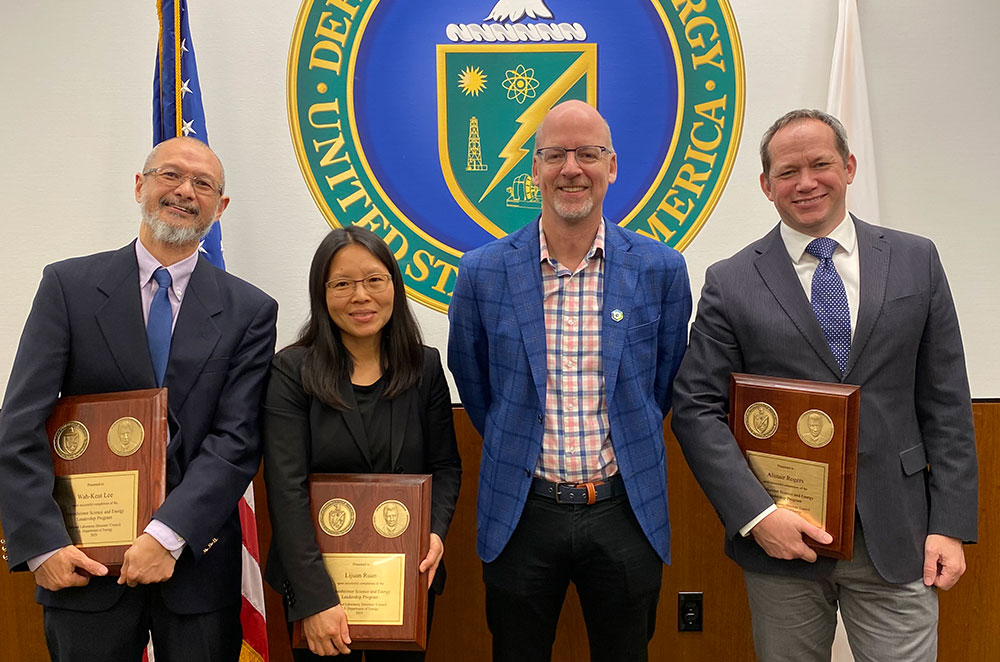Brookhaven Lab Scientists Complete 2023 Oppenheimer Leadership Program
Emerging Lab leaders connect on ways to improve DOE and national lab system
January 25, 2024
 enlarge
enlarge
Wah-Keat Lee, Lijuan Ruan, John Hill, and Alistair Rogers (left to right) at OSELP's capstone event in December 2023.
Wah-Keat Lee, Lijuan Ruan, and Alistair Rogers—all researchers at the U.S. Department of Energy’s (DOE) Brookhaven National Laboratory—explored the complexities, challenges, and opportunities facing the national lab system and DOE as 2023 Oppenheimer Science and Energy Leadership Program (OSELP) fellows.
The year-long program brings together professionals from national labs and their partners with the goal of cultivating the senior leaders needed to sustain long-term impacts and advance DOE missions throughout the complex. Candidates are nominated by national lab directors, assessed by a committee of former lab directors and former senior DOE officials, and accepted into the program by the National Laboratory Directors’ Council (NLDC).
“It is clearly a remarkable program and Lijuan, Alistair, and Wah-Keat all epitomize what the program brings to the lab system—dedicated, passionate, inclusive leaders,” said Brookhaven’s Deputy Director for Science and Technology John Hill, who joined the fellows at their capstone event in December.
OSELP’s sixth cohort included 34 fellows who joined forces to develop strategic think pieces that tackle major organizational, policy, scientific, and other challenges within DOE’s mission areas. The group also dove further into the national lab experience through virtual and physical site visits where they heard from senior lab leadership.
Wah-Keat Lee, a beamline scientist at the National Synchrotron Light Source II (NSLS-II)—a DOE Office of Science User Facility at Brookhaven Lab, noted how the program forms a diverse network of people committed to the mission of the national labs.
“I hope to be able to build on the friendships and trust we have developed this year,” said Lee, who listed additional takeaways from the fellowship: “The passion and dedication of the people we met at the labs. The amazing, high impact, and often incredibly complex work that is being done at the national labs. The importance of open communications, teamwork, and trust. The excitement of the OSELP alumni to give back and continue to engage in the system that has given us this great opportunity.”
Lee and colleagues developed a think piece called “Leveraging OSELP Alumni: Proposed Use Cases to Support the NLDC in Advancing the DOE-Lab Complex.” They suggested ways OSELP’s network of alumni can help carry out focused evaluations in mission-critical areas, use their expertise to respond effectively to disruptive technologies or crisis events, and collectively to address emerging challenges, share best practices, and support the priorities of the NLDC and DOE.
OSELP was an opportunity to understand the similarities and differences across the lab complex and a valuable chance have candid conversations with lab leadership about the challenges they face and their own career paths, said Alistair Rogers, plant physiologist and Brookhaven’s interim Environmental and Climate Sciences Department chair. Rogers will join DOE’s Lawrence Berkeley National Laboratory as its division director for the Climate and Ecosystem Sciences Division in the Earth and Environmental Sciences Area in March.
“The most rewarding part of the experience was the time spent with an incredible group of like-minded individuals,” Rogers said. “Almost immediately, we had a deep trust and comfort with one another that enabled open, meaningful, and enriching conversations that were both honest and supportive. It’s been an amazing experience. I am deeply grateful for the opportunity and proud to be an Oppenheimer Fellow.”
Rogers collaborated on a think piece called “Becoming Better Together: Advancing a Sense of Belonging in the National Laboratories.” The group recommended that labs adopt diversity, equity, and inclusion (DEI) best practices to equip their workforce with the tools they need to translate their lab’s core values into an embedded and sustainable culture that supports a sense of belonging across the complex. This is key to unlocking the full potential of the national lab system—a lack of diversity stifles innovation, they noted.
Lijuan Ruan, physicist and co-spokesperson for the STAR experiment collaboration at the Relativistic Heavy Ion Collider (RHIC)—a DOE Office of Science use facility at Brookhaven, said she appreciates the opportunity to have met her cohort members and hear different perspectives during lab visits.
“I learned how difficult or challenging it is to run a lab with a critical mission and tight budget,” Ruan said. “I appreciate the time each lab leadership team gave to us. The invaluable OSELP experience will certainly have a long and profound impact on how I think about things and how I implement some of the strategies we learned.”
Ruan and colleagues examined the “Future of Work Reinvented” for their think piece. The future success of national laboratories will rely on healthy workforce and collaborative workspaces, interlinked requirements that ensure labs can carry out their missions, they noted. Their recommendations include investing in modern shared spaces, seamless digital tools, training for managers in a hybrid workplace, early career mentoring, and efforts to gauge staff morale—all with the goal to attract and retain world-class talent at national labs.
Two more of Brookhaven’s own will participate in the OSELP’s seventh cohort in 2024: NSLS-II Deputy Director for Operations Teresa Daniels and Electron-Ion Collider Project Manager Luisella Lari.
OSELP is managed on behalf of the NLDC by the University of Colorado Boulder. Professor Kevin Doran serves as the program director. Inquiries about the program should be directed to Professor Doran at dorank@colorado.edu. More details about the program and alumni fellows may be found on the OSELP website.
Brookhaven National Laboratory is supported by the Office of Science of the U.S. Department of Energy. The Office of Science is the single largest supporter of basic research in the physical sciences in the United States and is working to address some of the most pressing challenges of our time. For more information, visit science.energy.gov.
Follow @BrookhavenLab on social media. Find us on Instagram, LinkedIn, X, and Facebook.
2024-21636 | INT/EXT | Newsroom









